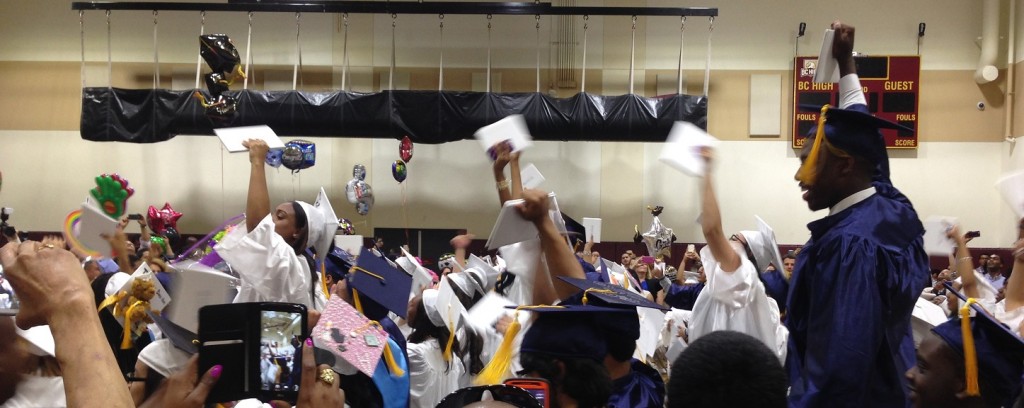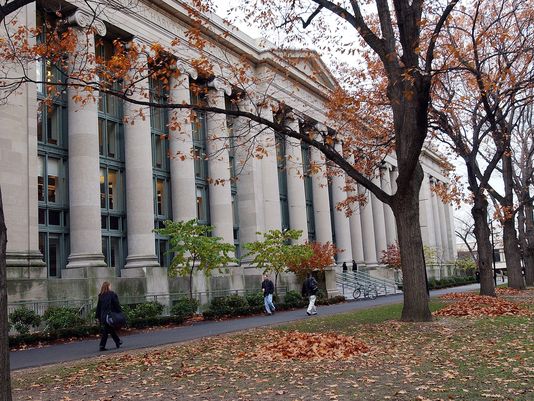A caravan of aunts, uncles, and cousins drove Alexandra Bernadotte from Mattapan to Dartmouth College in 1988, a triumphant parade of sorts for the Haitian immigrant family.
But if getting into Dartmouth was a dream come true for Bernadotte, graduating proved to be far more difficult.
Those years were shadowed by isolation, self-doubt, and near failure, marked by a low point in her sophomore year when she was forced to return home on academic suspension.
Now, nearly three decades later, Bernadotte is trying to ensure that first-generation, low-income, and minority students — whom elite colleges are recruiting to campus in ever-greater numbers — avoid the pitfalls she faced getting through college.
“I was unprepared,” said Bernadotte, 47, and founder of Beyond 12, a nonprofit that uses technology to work with high schools and colleges, helping coach students, track their progress and ensure that they earn their degrees. “I had never struggled academically — that was my thing.”
But from science classes to fitting in socially, “I struggled with every aspect of college life,” she said.
In recent years, colleges have become keenly aware that students with sparse financial resources and thin networks of adult support can struggle to adjust to campus life, with many failing to earn a degree.
Students with at least one parent who attended college are nearly twice as likely to graduate as first-generation students, according to a long-term study by the National Center for Education Statistics released in 2015.
Only 41 percent of academically strong, low-income students graduate from college, compared to 74 percent of students who came from high-income families, according to the national data.
Many of these first-generation and low-income students are also minorities.
Colleges and nonprofits have adopted a raft of interventions, from text messages to counseling, aimed at ensuring that students from diverse backgrounds don’t just get to campus, but thrive while they are there.
Bernadotte’s group, Beyond 12, tracks about 50,000 students, alerting them via an app to deadlines for course registration or financial aid applications, connecting them with campus resources, and ensuring that their grades and classes are appropriate. It has also coached, in-person or online, about 2,000 students on 180 campuses, many of them on the West Coast. A handful of charter schools in Boston and Dartmouth College have also tested out the platform.
Her vision for Beyond 12 was informed by her own experience.
Bernadotte, who now lives with her husband and 6-year-old son in a hilly neighborhood in Oakland, Calif., spent her early childhood in Haiti.
At 3 months old, she was left in the care of her grandmother, while her parents came to the United States for jobs and to settle in the Boston area. Her father got a job in a window-film factory. Her mother worked at Carney Hospital.
She was nearly 8 when she came to Boston and was reunited with her parents and a younger sister, who was born in the United States.
She initially spoke only French and Haitian-Creole, but school was rarely a problem. By the time she reached Fontbonne Academy, a Catholic, college preparatory high school for girls in Milton, she was taking Advanced Placement and honors classes.
Dartmouth College hit her family’s radar after her mother heard some doctors in the hospital’s emergency room raving about it.
When Bernadotte got in, her path seemed clear: She wanted to graduate with a degree from Dartmouth and eventually work in health care.
But Bernadotte said, in retrospect, she should have done more research on Dartmouth.
She never visited the college and only on the drive up, through long, wooded stretches, did it hit her that Dartmouth was far removed from the city life she was used to. On move-in day, the campus was bustling with new students unloading their belongings, but few of them were minorities. When she got to her dorm room, she discovered even her bedsheets were wrong — twin-sized, instead of the extra-long version necessary for dorm mattresses.
She also arrived at Dartmouth at a time of campus unrest. Two years before, a group of students, many from the college’s conservative publication, The Dartmouth Review, had been suspended for taking a sledgehammer to a shantytown built on campus to protest apartheid in South Africa. Gay students, feminists, and some Dartmouth staff and faculty had reported receiving anonymous hate letters. And a classroom scuffle between Dartmouth Review staff members and a black music professor that the publication once described as a “used Brillo pad” was still grabbing headlines.
That tension made it difficult, Bernadotte said, for her to step forward and seek help from tutors or professors when she struggled with math and science classes. Doubt crept in.
She wondered, “Maybe I did get in through affirmative action and asking for help was maybe a sign that I didn’t belong here.”
By the middle of her sophomore year, her grades slipped further, and the school forced her to take time off. She returned home to Mattapan, depressed, uncertain about what she wanted to study, and questioning whether she should return to Dartmouth or transfer to a college closer to home.
Bernadotte talked to a therapist and used the time to work with a friend’s mother, a pediatrician. She ultimately decided to return to Dartmouth but against pursuing a career in medicine.
When she returned, she roomed with a friend, joined a historically black sorority, became active in marches against apartheid and for a more diverse faculty, and asked for help when she needed it.
“I made sure I was comfortable,” Bernadotte said. “I no longer operated in the shadows.”
It helped when Dartmouth hired a new undergraduate dean, Sylvia Langford, who was a black woman, Bernadotte said.
Langford recalled Bernadotte often coming to her office and sighing in frustration.
“I never saw her really happy,” Langford said. “She was trying to do what she needed to do and get out.”
For minority students and those who had to work and go to school, being on an affluent and primarily white campus was a challenge, Langford said.
“Nobody told the kids they couldn’t be there, but they felt they weren’t comfortable,” said Langford, who retired from administration nearly three years ago. Colleges are now paying more attention to the challenges that first-generation, minority, and low-income students face on campus, she said.
“That doesn’t mean that it’s perfect,” she said. “But it’s better.”
Elite colleges with hefty endowments are assigning administrators to help students navigate the college bureaucracy and provide undergraduates with the help they need, whether it’s financial aid for textbooks, connecting them with summer internships, or calling them if they don’t show up to class, said Justin Strasburger, executive director of Bottom Line, a Boston-based organization that helps low-income and first-generation students primarily in the Northeast get into and through college.
Since 2009, Dartmouth has offered first-generation students a one-week summer orientation that includes intensive writing exercises, mock classes with tips on taking good notes and managing course loads, and mentoring that follows them through at least their first year, said Elizabeth Agosto, senior associate dean for student affairs.
More than 80 students — over half of the first-generation students entering Dartmouth in 2017 — participated, Agosto said. The grades for those in the program are now more likely over four years to match those of the student body as a whole, instead of lagging, and the students are less inclined to drop out of math and science fields, Agosto said.
“It gets them off on the right foot early,” she said.
But state colleges and smaller institutions don’t always have the resources to support these students, Strasburger said. Many are juggling jobs and classwork. Their parents may be encouraging but don’t always have the right answers. And students can easily get waylaid by financial problems or drawn into family struggles at home, he said.
Bernadotte was able to graduate from Dartmouth with the rest of her class in 1992, and she said the degree has opened many doors. She worked for the World Health Organization, Princeton Review, and a nonprofit that tried to improve college access for low-income students in East Palo Alto, before earning her graduate degree in education policy and leadership at Stanford University in 2007.
Two years later, she founded Beyond 12.
A college degree does change a student’s trajectory, Bernadotte said.
“I’m here because of it,” she said. “This is probably the dream that my parents had for me when they left Haiti.”
By Deirdre Fernandes, Globe Staff
Deirdre can be reached at deirdre.fernandes@globe.com. Follow her on Twitter @fernandesglobe.
This article originally appeared in The Boston Globe on January 30, 2018.


